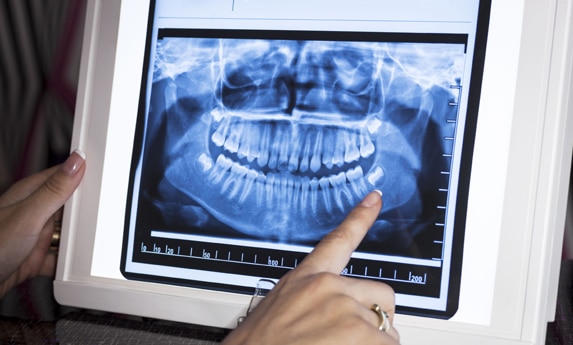An impacted tooth is when you have a tooth that is blocked from breaking through the gum. In some cases, teeth are partially impacted, but can still cause issues. Impacted teeth are usually found during your regular exam in the dentist office on an x-ray. Impacted teeth are usually because your mouth does not have the proper space for the tooth, or are caused from genetics.
At North Texas Oral & Facial Surgery, we provide the highest level of care, and our exams can identify impacted teeth, and provide the proper treatment to avoid complications in the future.
Symptoms of an Impacted Tooth
• Bad breath
• Bleeding or swollen gums
• Pain or difficulty when you open your mouth
• Pain during chewing or biting
What Teeth Are Typically Impacted?
Wisdom teeth are the most common teeth that are typically impacted. They are the last teeth to erupt, and typically erupt between the ages of 17 and 21. In some cases, the jaw and mouth are just too small to allow the wisdom teeth to come in. Wisdom teeth are usually removed if they are causing a problem, or if they are impacted because wisdom teeth are not needed.
In addition to wisdom teeth, the canines are another tooth that is typically impacted. These are the upper eye teeth in the mouth. Canines play an important role in our mouths, and treatment is typically recommended to help these teeth erupt properly.
How Are Impacted Teeth Treated?
Waiting
Impacted teeth may not cause any symptoms or pain, and in some cases waiting is the appropriate approach. Regular visits to the office are required to keep a close eye on the impacted tooth to ensure no problems develop.
Oral Surgery
If the patient is experiencing any symptoms or pain, extraction surgery may be recommended. This is when the impacted tooth is extracted surgically. Tooth extraction surgery is an outpatient procedure, and usually takes between 40-60 minutes. Local anesthesia is used to keep you pain free and comfortable. The recovery can take between 7-10 days, and patients can return to their normal routine a few days after surgery.
When the canine teeth are impacted instead of removing the teeth, doctors can install chains, or other orthodontic appliances to help the teeth erupt into place. If there are teeth blocking the canines, tooth extraction may also be necessary. In rare cases, if the tooth can not erupt, the impacted tooth is removed, and a dental bridge or implant can be used to replace the tooth.
If impacted teeth are not treated properly problems may develop including decay, infection, crowding, or absorption of bone. If you think you have symptoms of an impacted tooth, or are due for your regular exam, we encourage you to contact our office.
Ready To Find Out More About Impacted Teeth?
If you think you may have an issue, or are due for your regular exam, contact our oral surgeon in North Texas Oral & Facial Surgery. Treating impacted teeth is important to help prevent infection or damage to surrounding teeth. Attending your regular visits to our office can help identify impacted teeth early, and get in front of any issues before they develop. Our doctors have years of experience in oral surgery, and always treat patients with the highest level of care. We want you to know you are in good hands when you visit our office, and our staff will work to ensure your experience is positive.
To schedule your appointment, contact North Texas Oral & Facial Surgery, and our friendly staff will be happy to assist you.


